It takes a variety of significant materials to construct a dream project. Whether you are planning to build a commercial or a residential one, some essential materials make the construction process a lot easier. At Sree Metaliks Limited, we would love to cover all your construction needs and provide you with the essential materials needed for the same. So, let’s get started with the options.
|
Table of Content
|
Sponge Iron
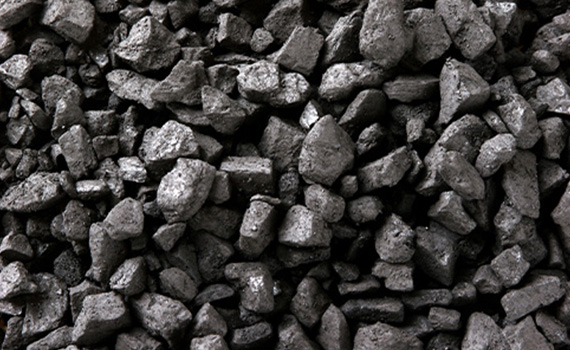
Have you been looking for top-notch sponge iron manufacturers in India? Well, your search now comes to an end, thanks to us. India is noted to be the largest producer of sponge iron in the world. It is mainly produced by following the coal production method. Moreover, the consistent availability of premium raw materials helps us enable cost-effective manufacturing of our products.
- Sponge iron is a metallic item made by reducing iron ore directly in its solid state.
- It is mainly used for making steel by following a secondary route.
- We ensure to furnish and manufacture premium quality sponge iron at competitive rates, creating values for our stakeholders and clients.
We have a separate sponge iron manufacturing plant designed to offer unmatched grade consistency and quality.
Iron Billets
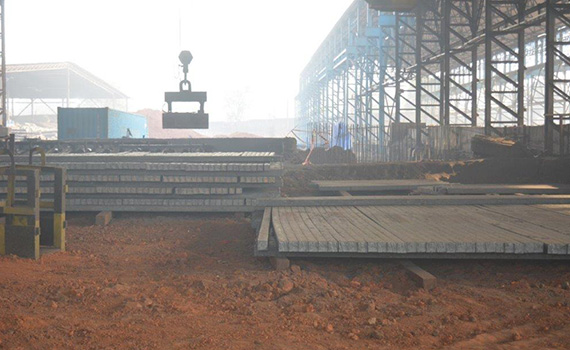
Sree Metaliks Limited is always the prime name that comes to your mind whenever you look for a top-quality iron billets manufacturer. We are one of the leading iron billet manufacturers in India, known for our unyielding high-quality standards.
- We work on cast iron billets, made using strict guidance and vigilance of our experienced engineers.
- We will manufacture the iron billets to match all your industrial standards.
Our team addresses corrosion-resistant alloys to the billets to make them highly durable.
TMT Bar
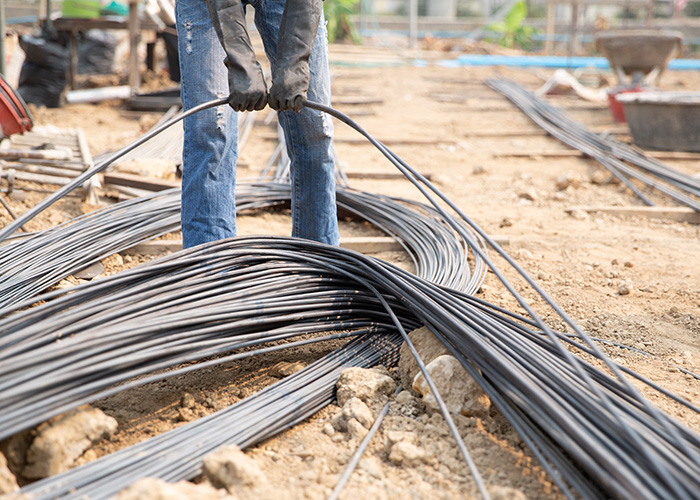
A strong core foundation is important if you want the construction to last long. The SML TITAN Bars will do the honour. We have a license from the Thermax Quenching System & Technology of Henningsdorfer Stahl Engineering and have been making a TMT bar with amazing flexibility and high strength.
- These bars are thermo-mechanically treated by focusing on tempcore technology.
The higher strength makes these bars perfect for manufacturing robust structures.
Also Read: Best TMT Bars Manufacturer In India
Iron Ore
Alongside production, we also focus on a steady supply of raw inputs, which helps in maintaining quality and efficiency in our steel operations.
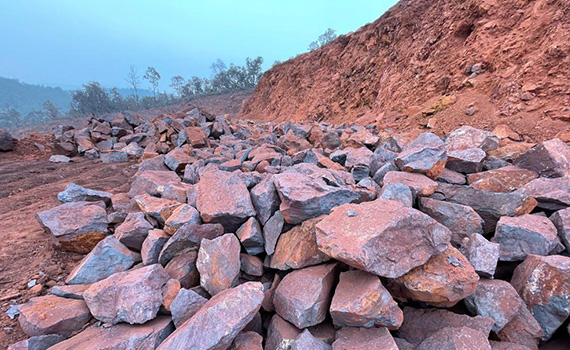
For the iron and steel industry, iron ore is a pivotal mineral resources. We are your leading iron ore miners in India. Our team has its own captive mines. We utilize our resources in the integrated steel plants. Our main goal is to produce finished items like pellets, sponge irons, billets, TMT bars and more.
Pig iron:
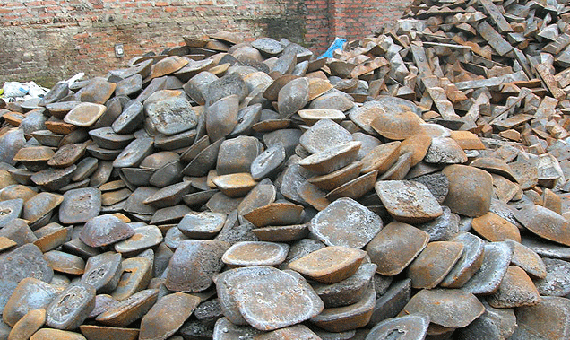
We will use the power of our Mini Blast Furnace for manufacturing pig iron. Here, we make hot metal from the iron oxide burden by using coke as fuel and reductant. So, get premium-quality pig iron from our source and within your pre-set budget plans.
Apart from the above stated materials that are used in construction, there are various other materials without which the construction is incomplete. Let’s have a look at these materials too and enhance our knowledge about construction and various material materials used for it.
Cement
Some of the construction materials like steel bars, bricks, and sand will bind well with the power of cement. Now, you can get cement under different grades as mentioned in the Indian Standards. Some of the examples are mentioned below for your reference.
- 33-grade cement: 33 Grade Cement has a composite strength of somewhat around 33N/mm2 after curing for 28 days. It is widely used in the general construction area and made for the lower concrete grade like the M20 or M15. Right now, this grade is not quite manufactured as there are some higher grades acceptable in the construction world.
- 43-grade cement: This grade has a complete strength of around 43N/mm2 after curing for 28 days. It is used for concrete work, plastering, and also for pre-casting items like blocks, tiles, and more. This is a great mix for the concrete grade up to M30.
- 53-grade cement: The 53 grade one is known for its composite strength of 53N/mm2 after 28 days of curing. It is made suitable for use on or over a concrete grade mix of M25. Nowadays, companies are looking for higher graded cement for their daily use; 53 Grade is the most common one used in the construction industry.
Sand
For covering constructional work, the market houses different kinds of sands these days. Sand is mainly particles of broken rock and is also a vital material for construction. It is because sand provides strength, bulk, and other properties to the concrete base. There are different types of sands available, and some are mentioned below:
- River sand: This kind of sand is whitish-grey in color and has rounded particles in them. These are procured from the banks of the river and noted to be highly effective for covering plastering work and other constructional sectors.
- Coarse sand or the pit sand: You can get coarse sand from the deep pits where the supply remains abundant. Here, the grains are noted to be sharp with a yellow-reddish tint to them. The sand is salt-free and used mostly in concreting.
- M sand: This form of sand is used as a substitute for river sand and is made by following the IS code. M sand is made by crushing basalt or granite rock and is also known as Stone Sand or Artificial Sand.
Bricks
When it comes to construction, bricks play a pivotal role. These are made from clay and are mostly available in a rectangular shape. Some of the major brick types used in the construction industry are mentioned below:
- Un-burnt bricks: These bricks are mostly sun-dried and used for temporary structures. Such bricks are not that durable, less water-resistant, and cannot resist fire that much. So, these bricks can’t be used for permanent structures.
- Burnt bricks: These burnt bricks are further categorized under four major sub-categories. So, let’s focus on that.
- First-class bricks: These are standard sizes ones, which have smooth surfaces and sharp edges. These are acceptable for load-bearing and to cover other masonry jobs.
- Second class bricks: Such bricks are well molded by the ground molding process, and the shapes are mostly irregular because of the ways they are manufactured.
- Third class bricks: These are poor quality bricks with rough surfaces with unfair edges used for temporary structures.
- Fourth class bricks: These are also poorer quality bricks, which will break easily. Such bricks are not used for structures and are used as coarse aggregate in some cases.
Coarse Aggregate:
The strength of concrete entirely depends on these coarse materials, making it one of the most critical components in the construction materials list. Choosing the right size and proportion of aggregate ensures the durability of structures, roads, bridges, and industrial projects.
Also Read : Best TMT Bars Manufacturer In India
Wood
If there is one common material used in a constructional category, then that has to be wood. There are a few of these wood types used, and some of those are listed below:
- Deodar wood: It falls under the timber category of softwoods. It is moderately soft in nature and used for making packing boxes, cheap furniture, structural work, and more.
- Teak wood: These woods are noted for their major characteristics like durability, fire-resistant, termite-proof and more. It can be used for various purposes like decorating the interiors of the house, making furniture, and more. It is one of the valuable woods that are limitedly used for superior work coverage.
- Satinwood: This material is noted to be durable and hard and used primarily for ornamental words, furniture making, etc.
- Mahogany wood: It is yet another example of higher quality wood, which is durable even underwater. This product is commonly used for manufacturing furniture because of its durability and longevity.
Apart from these options, there are some other available products like Sal wood, Shisham wood, pinewood, rosewood, mulberry wood, and more. Be sure to check out all the possible options related to wooden products before the final say from our side.
These are the top 5 essential materials that every construction site will need in India. Rely on us for quality products, which are perfectly crafted using guided experience. For core details on the manufacturing essentials, please give us a call at our toll-free number at 18002021355, or you can email us at info@sreemetaliks.com.
Conclusion
We bring together a curated selection of building materials that fit directly into modern infrastructure growth. With a complete range of materials for construction handled under efficient processes, we assure consistency in standards that align with today’s expanding urban needs.
For more information, please reach out to us at: Sales@sreemetaliks.com

